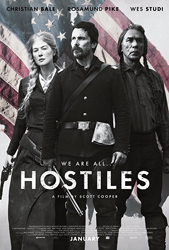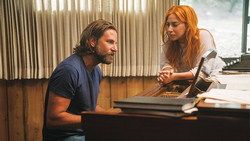Starring Christian Bale, Rosamund Pike and Wes Studi.
Somewhere out in the desolate deserts of America stands a tombstone that reads, “The American Western: 1903 to the 21st century.” 1903’s The Great Train Robbery marked the beginning of an era where audiences lined up to see cowboys gun down foes under the great big sky, but it’s hard to pinpoint when the genre officially died.
There have been unsuccessful attempts to revitalize it throughout the past eighteen years.
A notorious example is 2013’s The Lone Ranger that had a budget of $375 million and flopped by earning only $260.5 million when the dust settled.
With those results it’s clear: westerns have steered clear of people’s interest.
And why would audiences be interested in westerns today anyway?
Marvel has been spitting in the genre’s spittoon over the past decade with glittery CGI action and cash cow franchises.
Today, no one has the endurance to appreciate the stripped down grit of westerns, which is why audiences might overlook Hostiles.
Set in 1892, an Army captain, played by Christian Bale, escorts a Cheyenne chief, played by Wes Studi, and his family through the treacherous landscapes of New Mexico to Montana.
Although slow in its pacing, Hostiles is a tough western that has a strong leading performance by Christian Bale, along with relevant messages, sweeping visuals and a unique score.
I have never been in a theater with a more antsy audience. Throughout the two hours and ten minutes, audience members were anxiously waiting for someone like John Wayne to hop on a horse, kill a bunch of outlaws, then wink at the camera.
At least ten people left the theater, while others were sifting through the important news of Kylie Jenner’s hidden pregnancy on their brightly lit phones. Clearly, Hostiles isn’t your grandpa’s western.
It’s a slow burn with few action scenes which mostly explores the process of a group’s willingness to stop painting other races with a broad brush.
If you come expecting Clint Eastwood to have a duel with Eli Wallach in the setting sun, I hope you’re at least sitting in a comfortable chair.
Eastwood isn’t around, but luckily Christian Bale is on the saddle. Bale’s lead performance as the Army captain feels realistic.
The captain shows little emotion and scorns any Native Americans in his presence with a timid look or growling yell. Bale’s character has a dark past with the Natives, which is imminent with the dead gaze in his eyes.
This pent up anger in the Army captain is taken out on the Native Americans he kills and prisons every day.
While there isn’t so much gun slinging, the messages show how deep the roots of racial division are embedded in America.
The Army captain reluctantly accepts the mission to escort the Cheyenne chief because of his hatred towards Native Americans.
Along their journey, they come across a mother, played by Rosamund Pike, who also has sentiments towards the Natives.
Considering the film goes at a snail’s pace, Hostiles takes its time for the characters to chip away at the barriers of race.
Hostiles comes off as a typical cowboys versus Native Americans western, but by blending the Army captain’s entourage with the Cheyenne chief and his family, it shows how much effort it takes to understand the other side.
In today’s climate we instantly judge groups without giving the other side a chance.
However, the Cheyenne chief’s crew makes the effort to show the Army captain that there’s more goodness in their tribe than evil.
Not only do the characters face a long road to realization, but a rough journey to reach the Cheyenne chief’s home.
Incredibly captured by cinematographer Masanobu Takayanagi, the vastness of the terrain shows how daunting the expedition is from New Mexico to Montana. The Army captain leads his crew through scolding hot desert plains empty with life.
In the darkness of night, the crew lights a blazing fire under the shimmering desert stars.
Then it’s on to the next day, where the group could drift through the tall green plains, where the sun casts a light of hope. Takayanagi’s camerawork gives this western true grit.
While the Army captain’s crew trudges through the rugged west, the score by Max Richter uses a unique instrument that embodies the cut throat landscape.
The yaybahar is an electric free acoustic instrument consisting of coiled springs and frame drums.
The instrument makes its cinematic debut by sending out chilling vibrations across the sweeping landscapes drenched in sunlight. Hostiles’ score feels distinct like its story.
With the yaybahar encompassing the sounds of Hostiles, this isn’t a western for everyone. A majority of audiences will feel bored because of its lack of action and sluggish pacing.
However, it’s a western that sticks out of the pack for its relevant messages, strong leading performance, beautiful visuals and striking score.
Although it doesn’t have the making of a commercial success, Hostiles gives a fresh approach to the western genre. With more quality features like this, maybe the American western can knock over its tombstone.
As Sufjan Stevens sings in Should Have Known Better, “The past is the past/the bridge to nowhere.”
IMAGE TAKEN from filmlinks4u.is




